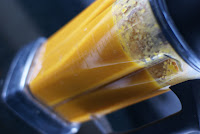High Fructose Consumption, Inflammation Up (Bad), LDL-to-HDL Ratio Down (Good) - Is That Good or Bad for the Heart?

Remember: If anything fructose from beverages (including juices), yet not fructose from whole fruit is a problem. In fact eating whole fruits will decrease your blood lipids and high sensitivity C reactive protein (hs-CRP) inflammation markers. Fructose is bad for you, right? Right. According to the latest study from the University of Newcastle , the consumption of only one drink containing containing 50 g of either fructose or glucose or sucrose dissolved in water will have detrimental effects on the #1 indicator of whole body inflammation, which is high sensitivity C-reactive protein (hs-CRP). Much to the researchers surprise, though, the same amount of fructose had significant beneficial effects on the plasma lipid levels of the healthy male and female adults (n = 14) between the ages of 18-60 years who were recruited by advertisement and underwent study procedures at the Nutraceuticals Research Group Clinic rooms at the University of Newcastle in Australia. Learn more a...




